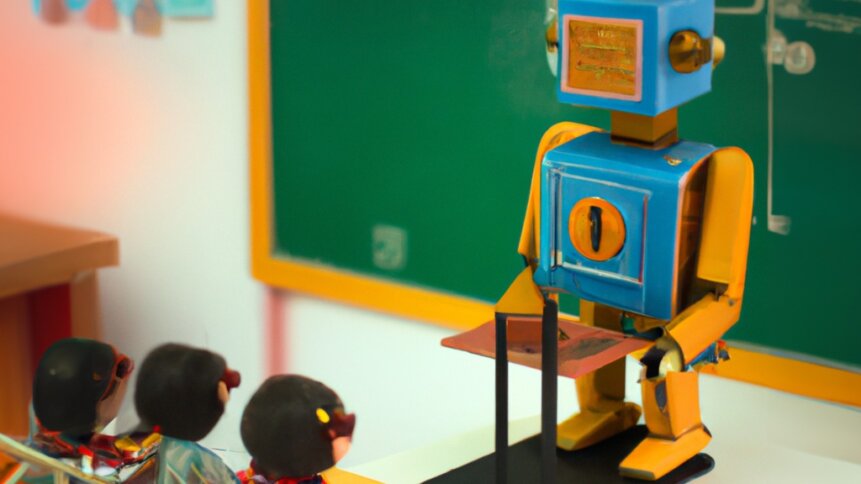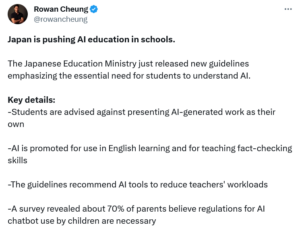Japanese schools prioritising AI education

• Japan is investing in AI education in schools.
• Teachers and parents will be encouraged into AI education too.
• The aim is to make young people responsible users of AI.
AI education in Japanese schools could pave the way for curricula around the world.
New guidelines from Japan’s education ministry stress the importance of students understanding artificial intelligence. Released on Tuesday 4th July, the guidelines lay out how generative AI can be integrated into schools and the precautions necessary to addressing associated risks.
The use of AI for learning English will be promoted, and the technology will be integrated into group activities. Students will be able to ask about and address different perspectives, enhancing the depth of discussions.
AI education – learning the pros and cons of an AI world
Students will have to be aware of the advantages and disadvantages of AI before they can use it. There must be an understanding of its characteristics – including the negatives; the potential for leaked personal information and copyright infringements, for example.
Advice against inputting personal information into the system is included in the guidelines, as is guidance on setting up the system so as to ensure this information won’t be used for machine learning.
“We are committed to addressing these concerns, enhancing teachers’ understanding and skills, and fostering a safe and effective environment for AI utilization in education,” education minister Keiko Nagaoka said on Tuesday.
Of course, AI literacy is also key among teachers. The tools can be used to reduce teachers’ workloads by streamlining administration and improving teaching practices. The guidelines also encourage teachers to use false information generated by AI as teaching materials to help students learn to fact-check.
On Monday, Hisanobu Muto, school digitization project team leader at the education ministry, said he “believe[s] that it is necessary to proceed with some experimental activities (based on the guidelines) in schools, taking full consideration of personal data protection, security and copyright to fully examine the outcomes and contribute to further discussions in the future.”
The potential use of AI to write reports and essays means that teachers might need to discard traditional exam and homework methods.
“If teachers themselves become familiar with the new technology and learn how to use it in a convenient, safe and smart way, they will be able to respond appropriately in their educational activities,” Muto said.

AI education – class is in session.
“We need to improve teachers’ AI literacy and (promote) working style reform by conducting teacher training and promoting the appropriate use of information in public service.”
The Japanese government might go as far as requesting that AI companies improve their products specifically for educational use. This would mean strengthening the filtering of harmful content, implementing personal information protection features and developing AI tools designed for students.
The guidelines are still tentative and subject to feedback-driven change, as well as being adaptable alongside other regulations about the technology. They are intended to be implemented in public schools as well as other educational institutions.
Parents are worried about AI education
In April and May, Tokyo-based CyberOwl conducted a survey that showed roughly 70% of 508 parents of students ranging from the third grade to high school believe children’s use of AI technology should be regulated.
Of the respondents, 49% said that they were “relatively anxious” about technologies like ChatGPT, while approximately 15% were “anxious.” Around 35% said they were worried about “the decrease in critical thinking ability,” and 34% expressed concerns about their children “believing false information.”
Anxiety levels among parents vary significantly, depending on whether they themselves have used ChatGPT. 72.9% of parents who haven’t used ChatGPT are worried or relatively worried about the use of AI chatbots by children, where only 44% of those who have used the technology had the same level of concern.

AI education – coming, ready or not.
“Generative AI can be easily used on smartphones and computers, and therefore I believe that teachers and parents should have first-hand experience of using it,” said Tatsuya Horita, a professor of information and technology at Tohoku University.
“Rather than having vague concerns about something they don’t know, it is important to educate them on understanding the mechanisms and using it appropriately.”
Given the increasing and apparently unstoppable uptake of AI in industry and elsewhere, the decision by the Japanese education ministry might pave the way for curricula worldwide to adapt to the new technology.











